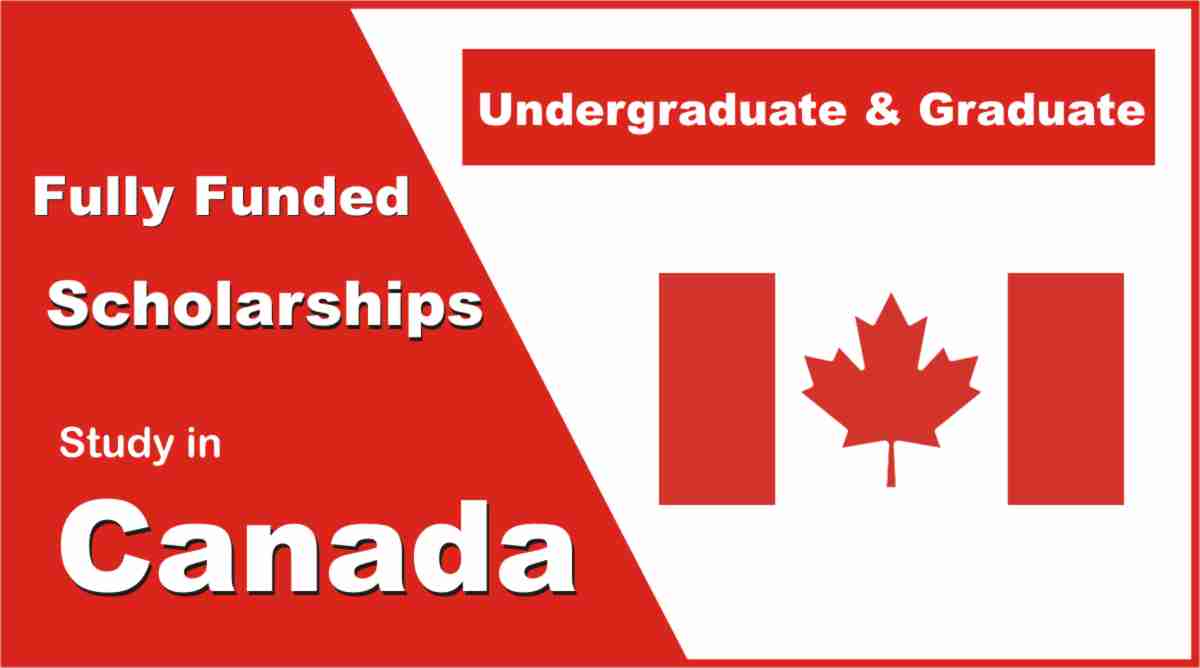Schools, Colleges and Universities in Canada that accept HND, Third Class and Second Class For Masters Degree in 2024
Canada has a number of higher education institutions that accept HND and 3rd class for Masters and other advanced postgraduate courses. The best alternative route to gaining a qualification is via an alternative route – such as distance learning, Vocational Education Training (VET), community college, or online university.
If you have just finished your first degree and want to further your education, then look at these Canadian universities that accept a third class degree for Master’s.
If you want to study in Canada and get a good degree, the country should be a very attractive place for you. Many Canadian Universities accept 3rd class honours for Master’s admission. There are many universities in Canada besides McGill, UBC, and Toronto that accept third class honours for admission into their master’s degree program.
Please endeavour to check out the Requirements in Applying for Master in Canadian Universities and How to Get Admission to a Canadian University Here.
List of Colleges in Canada that Accept HND, Second Class, and 3rd Class for Master’s
The following list shows universities in Canada that accept a third class honours degree as the minimum entry requirement for an MA course of study.
1. College of New Caledonia
2. New Brunswick Community College
3. Lambton College
4. Niagara College
5. North Atlantic College
6. Algonquin College
7. Humber College
8. Seneca College
9. Lethbridge College
10. Camosun
There are numerous fully funded scholarships in Canada available for international students for their undergraduate, Master’s, and PhD degrees in Canadian Universities. We have compiled these Scholarships Here.
Question: Don’t think Canadian colleges accept HND for masters, you’ll go through PGD programs first
Answer: I was admitted to YORK UNIVERSITY in 2023 with an Ordinary Diploma (ND) but was denied a visa based on no good tiles that I would leave Canada after my studies. So Canadian Colleges do accept HND certificates for Master’s study.
Also, there are Schools, Colleges, and Universities in the UK that accept HND, Third Class, and Second Class For Master’s Degrees.
A Comprehensive Guide to Applying for Master’s Degree Programs in Canadian Universities as an International Student
Canada is a popular destination for international students seeking to further their education at the graduate level. With a diverse range of universities and programs, Canada offers students an excellent education, along with a high quality of life and a welcoming atmosphere. However, applying to a master’s degree program in Canada can be a daunting task, especially for international students who may not be familiar with the Canadian higher education system. In this guide, we will provide you with a comprehensive overview of the process of applying to a master’s degree program in Canada as an international student.
Admission Requirements for Master’s Degree Programs in Canada
The admission requirements for master’s degree programs in Canada vary depending on the institution and the program you are applying to. However, there are some general requirements that most universities in Canada require from their applicants:
- Academic Credentials: You must hold a bachelor’s degree or its equivalent from an accredited institution. Most universities in Canada require a minimum GPA of 3.0 on a 4.0 scale or its equivalent.
- English Language Proficiency: If your first language is not English, you must demonstrate your proficiency in English by submitting the results of an English language test. The most commonly accepted tests are TOEFL (Test of English as a Foreign Language), IELTS (International English Language Testing System), and PTE (Pearson Test of English). Each institution has its minimum score requirements for these tests.
- Letters of Recommendation: You will need to provide two or three letters of recommendation from your professors or other professionals who are familiar with your academic work.
- Statement of Purpose: You will be required to write a statement of purpose outlining your academic and professional goals and how the program you are applying to will help you achieve those goals.
- Resume or Curriculum Vitae: You will need to provide a resume or CV that highlights your academic and professional experience.
- Application Fee: Most universities charge an application fee, which varies between institutions.
In addition to these general requirements, some programs may have specific requirements, such as work experience, portfolio, or research proposal. Therefore, it is essential to research the specific requirements for the program you are applying to.
How to Select the Right University and Program to Study in Canada
Selecting the right university and program is a critical step in the process of applying to a master’s degree program in Canada. Canada has a large number of universities, each with its strengths and weaknesses. Therefore, it is essential to research the universities and programs thoroughly before applying.
- Research Universities: Research the universities that offer the program you are interested in and their reputation in the field. Look for their academic and research strengths and see if they align with your interests.
- Faculty: Look for the faculty members who teach in the program you are interested in and their research interests. Check if their research aligns with your interests, and if they are actively engaged in research.
- Program Requirements: Check the program requirements for the specific program you are interested in. Look at the courses offered, the program duration, and the mode of delivery.
- Location: Consider the location of the university and how it aligns with your lifestyle and interests. Look for the availability of housing, public transportation, and other amenities.
- Funding Opportunities: Look for funding opportunities, such as scholarships, grants, or assistantships, and see if you are eligible for them.
Master’s Degree in Canada Application Process
Once you have selected the universities and programs you want to apply to, you can begin the application process. The application process for master’s degree programs in Canada typically involves the following steps:
- Application Form: Fill out the online application form for the university and program you are applying to. The application form will ask for your personal information, academic history, and program of interest.
- Supporting Documents: Gather all the supporting documents required for the application, including transcripts, English language proficiency test scores, letters of recommendation, resume or CV, and statement of purpose.
- Application Fee: Pay the application fee, which varies depending on the institution.
- Submit the Application: Once you have completed the application form and gathered all the required documents, submit your application.
- Application Review: The university will review your application and inform you if any further information or documents are needed.
- Admission Decision: After the university has reviewed your application, you will receive an admission decision. If you are accepted, you will receive a letter of acceptance, and you can proceed with the next steps of the process.
- Visa Application: If you are an international student, you will need to apply for a study permit to study in Canada. You can apply for a study permit after you receive an acceptance letter from a Canadian university.
- Housing and Transportation: Once you have received your acceptance letter and study permit, you can start looking for housing and transportation options.
Funding Opportunities for International Students in Canada
The cost of studying in Canada can be expensive, especially for international students. Therefore, it is essential to explore funding opportunities that can help finance your education. Some of the funding opportunities available for international students include:
- Scholarships: Many universities in Canada offer scholarships to international students. These scholarships can cover tuition fees, living expenses, and other costs.
- Grants: Some organizations offer grants to international students to help finance their education.
- Assistantships: Some universities offer teaching or research assistantships to international students. These assistantships provide a stipend and cover tuition fees.
- Work-Study Programs: Some universities offer work-study programs that allow students to work on campus and earn money to help cover their expenses.
Frequently Asked Questions
Can I apply to any master’s degree program in Canada with an HND or third-class degree?
No, not all universities in Canada accept HND and third-class degrees for admission into their master’s degree programs. However, some universities do accept these qualifications. It is important to research the admission requirements of each university and program before applying.
What are the admission requirements for master’s degree programs in Canada that accept HND and third-class degrees?
The admission requirements may vary depending on the university and program, but typically, applicants are required to provide transcripts, English language proficiency test scores, letters of recommendation, a resume or CV, and a statement of purpose. It is important to note that some universities may also require additional documentation, such as a portfolio or writing sample.
Will my HND or third-class degree affect my chances of getting a scholarship or funding?
It is possible that having an HND or third-class degree may affect your chances of getting a scholarship or funding, as many scholarships and funding opportunities have GPA requirements. However, there are still scholarships and funding opportunities available for students with these qualifications. It is important to research and apply for all available funding opportunities.
Can I study and work in Canada as an international student with an HND or third-class degree?
Yes, international students with HND or third-class degrees can study and work in Canada, but they must meet the admission requirements for the university and program they are applying to. In addition, international students must obtain a study permit and a work permit to work in Canada.
How long does it take to complete a master’s degree program in Canada?
The duration of a master’s degree program in Canada may vary depending on the university and program, but typically it takes 1-2 years to complete. Some programs may require students to complete a thesis or a research project, which may extend the duration of the program.
Can I still apply for a master’s degree program in Canada if I have a Third Class degree?
Yes, many universities in Canada consider applicants with a Third Class degree for their master’s degree programs. However, admission is not guaranteed, and you must meet other admission requirements, such as relevant work experience, strong letters of recommendation, and a well-written statement of purpose.
Are HND holders eligible to apply for master’s degree programs in Canada?
Yes, many universities in Canada accept Higher National Diploma (HND) holders for their master’s degree programs. However, you must meet other admission requirements, such as English language proficiency and relevant work experience.
Do I need to take an English language proficiency test to apply for a master’s degree program in Canada?
Yes, if English is not your first language, you need to take an English language proficiency test such as IELTS, TOEFL, or PTE. Many universities in Canada require a minimum score for admission to their master’s degree programs.
Are there any scholarship opportunities available for international students in Canada?
Yes, there are several scholarship opportunities available for international students in Canada. Many universities offer scholarships to international students based on academic merit, leadership skills, and financial need. Additionally, there are several external scholarship opportunities available, such as the Vanier Canada Graduate Scholarship and the Canadian Commonwealth Scholarship Program.
Can I work while studying in Canada as an international student?
Yes, international students can work while studying in Canada. Students can work on-campus without a work permit and can work off-campus with a work permit. Additionally, students can apply for a co-op or internship program, which provides them with work experience in their field of study. However, it is essential to check the work permit requirements before starting any job.
Conclusion
Applying to a master’s degree program in Canada as an international student can be a daunting task, but with the right information and guidance, it can be a smooth process. In this guide, we have provided a comprehensive overview of the admission requirements, selecting the right university and program, the application process, and funding opportunities available to international students. By following the steps outlined in this guide, you can successfully apply to a master’s degree program in Canada and embark on a rewarding educational journey.









